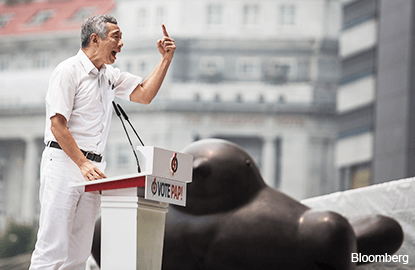
(Sept 11): Singaporeans voted in every district for the first time since independence, with Prime Minister Lee Hsien Loong’s People’s Action Party expected to win re-election despite the expanded presence of opposition parties in the contest.
The party that has ruled Singapore for more than five decades will have an indication soon after 8pm how it performed compared to 2011, when it won with its smallest share of the popular vote since 1965. The Elections Department will conduct a sample count, where 100 random ballot papers are counted in each polling station once voting ends.
The poll gives Singaporeans a chance to assess how Lee’s administration has fared in tackling issues that hurt it in 2011, including living costs, public transport disruptions and immigration. The PAP moved after that vote to further boost spending on lower-income families and the elderly, and has sought to capitalize on the groundswell of patriotism that followed massive celebrations last month to mark the nation’s modern founding.
“They’re evolving with the electorate,” said Wai Ho Leong, a Singapore-based economist at Barclays Plc, referring to the PAP. “The burning issues that were with Singapore in 2011 have since receded because the government has systematically worked to address some of these election concerns that were very pressing in 2011.”
‘Feel Threatened’
Adrian Tam, a 25-year-old engineer and first-time voter, had Malaysian rice balls with curry at a local hawker center with his parents before heading to a polling station. The PAP has been more responsive since it lost seats in 2011, said Tam, an eight-year resident of Jurong in Singapore’s west. “You wake up when you feel threatened.”
Challenges remain for a country facing an aging workforce and doubts over traditional pillars of growth like manufacturing and electronics. The export-driven economy has been damped by China’s slowdown, uneven recoveries in the US and Europe and a commodities slump. The Singapore dollar is set for its biggest annual loss since 1997 and its stock index is the second-worst performing Asian benchmark index in local currency terms this year.
One of the biggest issues for voters is the reliance on foreign workers, said Eugene Tan, an associate professor at the Singapore Management University and a former nominated member of parliament.
‘Demographic Challenge’
“We need immigration partly because of demographic challenges as well as economic realities,” Tan said on Bloomberg Television. “This election will be important because of the signal it will send on whether Singaporeans will continue to be open and how foreign investors will interpret Singapore’s openness to foreign manpower, foreign ideas and foreign investment.”
Nine opposition parties are contesting the 89 parliamentary seats up for grabs, alongside a handful of independents. Among them, only the Workers’ Party won seats in 2011. It had seven, compared with 79 for the PAP, before parliament was dissolved for the poll.
The Workers’ Party drew tens of thousands to its rallies, with Singaporeans packing open fields in the suburbs to listen to chairman Sylvia Lim speak. The Singapore Democratic Party has seen the return of its chief Chee Soon Juan after he was cleared of bankruptcy in 2012. He was declared bankrupt after failing to pay S$500,000 ($351,000) for defaming PAP leaders during the 2001 election.
‘Meaningful Election’
“It is a meaningful election as the opposition have become more mature,” salad vending machine company owner Jing Quek, 32, said as he headed to vote in Tanjong Pagar in central Singapore. “I don’t think I am happier now than in 2011. The cost of living will always be an issue, as well as rent and labor. These are deep-seated problems that cannot change overnight.”
Still, the ruling party is likely to keep its majority as it retains support from citizens who see it as the force that turned a small trading port into Southeast Asia’s richest country. The death of party founder and first prime minister Lee Kuan Yew in March led to an outpouring of national grief.
A record 2.46 million Singaporeans get to vote, and casting a ballot is compulsory for citizens 21 and over. Politicians compete in single-seat wards or multiple-seat districts. The party that gets the most votes in a constituency sends all its members to parliament.
‘Fully Contested’
“The best thing is that this time it’s fully contested," said Ruth Paul, a 34 year-old sales manager of Indian descent. “All the Singaporeans will vote so we get a chance to know what the entire population thinks.”
The ruling party has built its online presence since 2011, when an undercurrent of discontent emerged on social media. Lee has actively taken to Twitter since April last year and has more than 210,000 followers. In January he held his first online chat on his personal Facebook page.
“If one party stays as government for many years they become complacent,” said,” said David Ng, 55, who owns a chemical business that employs 15 workers. “Definitely the government has improved on many fronts but that is because there are more opposition MPs.”
In a country where the operator of the biggest television and radio stations is indirectly owned by the government, some have turned to news portals, blogs and social media for alternative views. Topics like train breakdowns, housing prices, stresses of the local education system and anti-foreigner sentiment regularly crop up in such forums.
A socio-political site was suspended earlier this year for publishing prohibited material including inciting anti-foreigner sentiments and two of its editors were charged with sedition. Roy Ngerng, a blogger who was found to have defamed Lee and is being sued by him for damages, is standing against Lee in his ward in the poll.